Archive for November, 2008
-
Cognizant Technology Solutions
Eddy Elfenbein, November 17th, 2008 at 1:51 pmCognizant Technology Solutions (CTSH) has some of the most impressive financials of any stock you’re likely to see. Recently, the company’s earnings growth rate has dropped from about 50% to a year, to just 19% for the last earnings report. The stock, however, has plunged by over 60% since early 2007.
Here’s a chart showing the stock price (blue line, left scale) and the earnings-per-share (gold line, right scale). The two axes are scaled at a ratio of 50-to-1 which means that when the lines cross, the P/E ratio is 50. Using 50 is obviously a very high multiple. But as you can see, that’s what the stock was following for a long time.
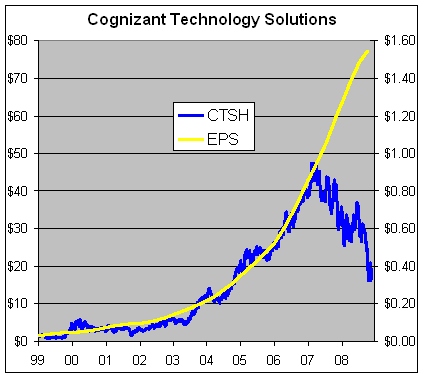
The stock is currently going for less than 10 times next years’ earnings. Here’s what I wrote about Cognizant two years ago:One of the more fascinating companies in the world today is Cognizant Technology Solutions (CTSH). The company, along with Wipro and Inforsys, is one of the foremost names associated with IT outsourcing, particularly to India.
While Cognizant is officially based in lovely Teaneck, NJ, its heart truly lies in the subcontinent. The company currently has over two dozen development centers in India. The growth in this business is simply astounding. The IT/outsourcing sector of the Indian economy is expected to grow from $17.2 billion in 2004, to $50 billion by 2009.
For any company looking to cut costs and have someone else handle their IT problems, Cognizant is great place to go. Half of their business is clients in the financial services sector. In fact, JP MorganChase, one of the scions of Wall Street, is a major client. Another 20% of Cognizant’s business comes from health care companies like UnitedHealth.
Cognizant was spun off from Dun & Bradstreet a few years ago and it hasn’t looked back since. As someone who pores over lots of financial statements, I can tell you that Cognizant’s results are extremely impressive. The company has consistently been able to grow its earnings over 50% a year. That’s no easy trick. Also, the company has a solid balance sheet and its operating margins are often around 20%.For Q4, the company expects non-GAAP earnings of 43 cents a share. That would be a growth of rate of 18%, and the fifth straight quarter of slowing growth.
For number geeks, here’s a spreadsheet with CTSH’s financials. -
Citi to Cut 50,000 Jobs
Eddy Elfenbein, November 17th, 2008 at 11:03 amThe news coming out of Citigroup (C) seems to be from bad to worse. At one point, I thought it would be good to break up the bank into four different companies. Now, I’m not sure even that would help. The company has just recently announced that it will cut 50,000 jobs. Shares of Citi are now in the single digits.
The company is having a townhall meeting with its employees today. Here’s a look at the slideshow. -
Belt Tightening: Wall Street’s Version
Eddy Elfenbein, November 17th, 2008 at 10:47 amAs you may have noticed, things are a bit tight on Wall Street these days. Now we hear that the CEOs understand the virtue of self-sacrifice. Lloyd Blankfein, the head of Goldman Sachs, for example, will forgo his executive bonus this year. His base salary is $600,000. Last year’s bonus was $70 million. So he’s giving himself a 99% pay cut. Deutsche Bank and UBS have also given up bonuses this year for the top brass.
I’m not sure why there’s such a focus on CEO pay. All I can say is that politicians loves to complain about it and it seems to have some resonance among voters. If regulators think CEO pay is somehow connected to the mortgage mess, then they’re proving to me that they shouldn’t be in the regulation business. -
Buy a Bank for $10 Million, Get $3.4 Billion from the Feds
Eddy Elfenbein, November 16th, 2008 at 9:39 pmHartford Financial Services Group Inc. said it’s buying a Florida bank for $10 million so the insurer can be eligible for the Treasury rescue program. Hartford, based in the Connecticut city of the same name, expects to qualify for $1.1 billion to $3.4 billion under Treasury guidelines, the company said in a statement distributed today by Business Wire.
-
Worst Paragraph of the Day
Eddy Elfenbein, November 16th, 2008 at 8:23 amNo major market problem has been resolved through self-regulation, because individual competitive behavior doesn’t concern itself with the larger market. Individual actors care only about performing better than the next guy, doing whatever is permitted — or will go undetected. Look at the major bubbles and market crises. Long-Term Capital Management, Enron, the subprime lending scandals: All are classic demonstrations of the bitter reality that greed, not self-discipline, rules where unfettered behavior is allowed.
I think greed rules even where unfettered behavior isn’t allowed.
-
12% Real Yield
Eddy Elfenbein, November 14th, 2008 at 11:27 pmWant to make 12% after inflation? Well, for two months….
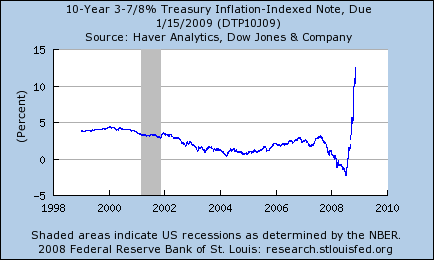
-
The Recession Gets Serious
Eddy Elfenbein, November 14th, 2008 at 10:52 amThe Brits aren’t going to the pubs:
Robert Munro buys his booze at London liquor stores these days. As his expenses rise and Britain teeters on the edge of recession, the house painter is cutting back on nights out and pouring drinks at home.
“It’s gotten more and more expensive to just head down to the pub for a drink,” said Munro, 55, who is self-employed. “You’re paying silly prices for a pint — you can drink at home for half the price.”
Five British pubs are closing their doors every day, according to the British Beer & Pub Association, as pound- pinching drinkers embrace staying in as the new going out. That may hurt beer companies like Heineken NV and Carlsberg A/S more than distillers, such as Diageo Plc, because the brewers generate the majority of their U.K. sales at bars, where profitability can be double the level in retail outlets. -
Corporate Bond Spreads
Eddy Elfenbein, November 14th, 2008 at 12:56 amHere’s a fascinating look at corporate bond yields over the past 90 years. I got the data off the Federal Reserve Bank of St. Louis’ data bank. This chart shows the yields of Moody’s index of Aaa and Baa seasoned corporate bond yields.

You’ll notice that the gap has widened significantly. This signifies what we already know, that lenders have become extremely risk-averse. Here’s a look at the difference between the two yields:
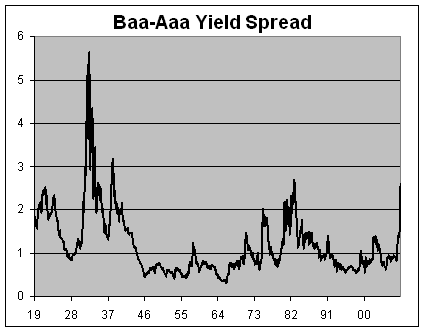
The premium for high-quality lenders is as high as it’s been since the recession of the early 1980s. We’re still a long way from the spreads we had during the Great Depression.
That data series is based on monthly averages, so to zoom in a little, let’s look at the weekly data which begins in 1962.

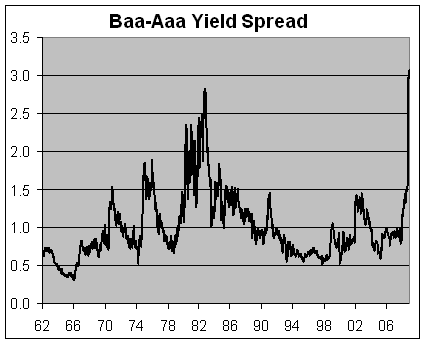
According to the daily series, which goes back to 1986, the spread reached 312 basis points on October 27. That’s the widest spread found in the daily records. According to my calculations, the entire gain of the S&P 500 has come when the spread is 96 basis points or less. The spread has been more than that every day for almost a year. -
GE’s Dividend Yield
Eddy Elfenbein, November 13th, 2008 at 11:27 am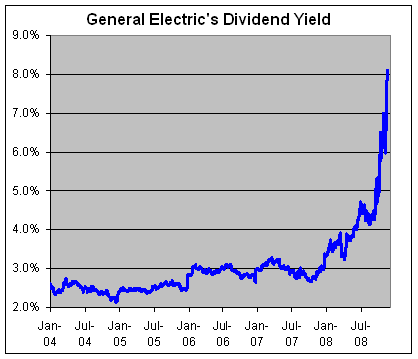
Hmmm. Something tells me that GE’s 31-cent quarterly dividend payment isn’t quite sustainable. -
When Investment Schemes Go Bad
Eddy Elfenbein, November 13th, 2008 at 10:18 amThey’re rioting in Columbia over the collapse of a pyramid scam:
Thousands of Colombians have taken part in violent protests in several cities to demand the return of money invested in disreputable financial schemes.
Police used batons and tear gas to control angry investors and curfews were declared in several cities.
In Popayan in the south-western department of Cauca, 2,000 depositors stormed an investment firm’s offices.
In Pereira, in Risaralda, police caught two men hurrying out the back door of a scheme’s office with suitcases of cash.
They offered one of the cases to the police to let them go.
The BBC’s Jeremy McDermott in Medellin says they are now in custody and that is the safest place for them, as conned investors have threatened to lynch them.
-
-
Archives
- April 2025
- March 2025
- February 2025
- January 2025
- December 2024
- November 2024
- October 2024
- September 2024
- August 2024
- July 2024
- June 2024
- May 2024
- April 2024
- March 2024
- February 2024
- January 2024
- December 2023
- November 2023
- October 2023
- September 2023
- August 2023
- July 2023
- June 2023
- May 2023
- April 2023
- March 2023
- February 2023
- January 2023
- December 2022
- November 2022
- October 2022
- September 2022
- August 2022
- July 2022
- June 2022
- May 2022
- April 2022
- March 2022
- February 2022
- January 2022
- December 2021
- November 2021
- October 2021
- September 2021
- August 2021
- July 2021
- June 2021
- May 2021
- April 2021
- March 2021
- February 2021
- January 2021
- December 2020
- November 2020
- October 2020
- September 2020
- August 2020
- July 2020
- June 2020
- May 2020
- April 2020
- March 2020
- February 2020
- January 2020
- December 2019
- November 2019
- October 2019
- September 2019
- August 2019
- July 2019
- June 2019
- May 2019
- April 2019
- March 2019
- February 2019
- January 2019
- December 2018
- November 2018
- October 2018
- September 2018
- August 2018
- July 2018
- June 2018
- May 2018
- April 2018
- March 2018
- February 2018
- January 2018
- December 2017
- November 2017
- October 2017
- September 2017
- August 2017
- July 2017
- June 2017
- May 2017
- April 2017
- March 2017
- February 2017
- January 2017
- December 2016
- November 2016
- October 2016
- September 2016
- August 2016
- July 2016
- June 2016
- May 2016
- April 2016
- March 2016
- February 2016
- January 2016
- December 2015
- November 2015
- October 2015
- September 2015
- August 2015
- July 2015
- June 2015
- May 2015
- April 2015
- March 2015
- February 2015
- January 2015
- December 2014
- November 2014
- October 2014
- September 2014
- August 2014
- July 2014
- June 2014
- May 2014
- April 2014
- March 2014
- February 2014
- January 2014
- December 2013
- November 2013
- October 2013
- September 2013
- August 2013
- July 2013
- June 2013
- May 2013
- April 2013
- March 2013
- February 2013
- January 2013
- December 2012
- November 2012
- October 2012
- September 2012
- August 2012
- July 2012
- June 2012
- May 2012
- April 2012
- March 2012
- February 2012
- January 2012
- December 2011
- November 2011
- October 2011
- September 2011
- August 2011
- July 2011
- June 2011
- May 2011
- April 2011
- March 2011
- February 2011
- January 2011
- December 2010
- November 2010
- October 2010
- September 2010
- August 2010
- July 2010
- June 2010
- May 2010
- April 2010
- March 2010
- February 2010
- January 2010
- December 2009
- November 2009
- October 2009
- September 2009
- August 2009
- July 2009
- June 2009
- May 2009
- April 2009
- March 2009
- February 2009
- January 2009
- December 2008
- November 2008
- October 2008
- September 2008
- August 2008
- July 2008
- June 2008
- May 2008
- April 2008
- March 2008
- February 2008
- January 2008
- December 2007
- November 2007
- October 2007
- September 2007
- August 2007
- July 2007
- June 2007
- May 2007
- April 2007
- March 2007
- February 2007
- January 2007
- December 2006
- November 2006
- October 2006
- September 2006
- August 2006
- July 2006
- June 2006
- May 2006
- April 2006
- March 2006
- February 2006
- January 2006
- December 2005
- November 2005
- October 2005
- September 2005
- August 2005
- July 2005
 Eddy Elfenbein is a Washington, DC-based speaker, portfolio manager and editor of the blog Crossing Wall Street. His
Eddy Elfenbein is a Washington, DC-based speaker, portfolio manager and editor of the blog Crossing Wall Street. His